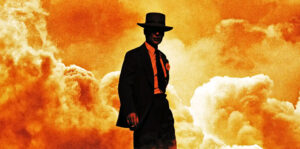It was supposed to be the ultimate mic drop. For almost a decade — Quentin Tarantino has been touting his plan to retire after his tenth and final movie, The Movie Critic. It was, he said, “based on a guy who really lived but was never really famous, and he used to write movie reviews for a porno rag.” and in true Tarantino fashion it was set to star Brad Pitt, with John Travolta, Jamie Foxx and Margot Robbie rumoured to reprise their roles in previous Tarantino movies, in what would amount to a farewell to the entire QT “metaverse”. Sony was financing it. Cameras were ready to roll. The director was ready to go out on top. “Drop the mic, boom!” he said. “Tell everybody: ‘Match that shit!’”
And, then, the same month Pulp Fiction celebrates its 30th birthday, the 61-year-old director abruptly announced that The Movie Critic was no more. Apparently crushed beneath the weight of expectation foisted on the project by its creator, Tarantino announced its cancellation. There was talk of endless rewrites for a script described as a nostalgic character study set in the seedy LA milieu, in which Tarantino first discovered the movies, featuring a character based on The New Yorker’s legendary film critic Pauline Kael, whose hold on the director — seems to have played a big role in Tarantino’s self-psych-out.
Kael pops up in Tarantino’s recent book of film criticism, Cinema Speculation, more frequently than Alfred Hitchcock, Francis Ford Coppola, Brian De Palma, Sergio Leone and Steven Spielberg, and is the source of Tarantino’s much-vaunted go-out-with-a-bang-Butch-and-Sundance retirement plan. “I just don’t want to be an old-man filmmaker,” he has said, repeatedly, over the years “I want to stop at a certain point. Directors don’t get better as they get older.”
The opinion was fully explored by Kael in a 1998 interview. “I do think directing is a young man’s game,” she told Modern Maturity, which Tarantino would have read about the same time he was recovering from the disappointing box office of Jackie Brown. “Directing is something people do best when they’re young, with the possible exceptions of Vittorio de Sica and Luis Buñuel. When you’re young, you use all your senses and have the devilry to do something new that will affect an audience deeply. Spielberg doesn’t do now what he did as a young man. He did crazy, goofy things. Jaws was a great comedy; in E.T., he let his childhood feelings inform the material in a direct way. But Hook was deadly, no child’s imagination left in it. Schindler’s List is a work of feeling, but planned feeling. Everything becomes safer and more extravagant as you get older.”
Is this true? And even if it is true, should filmmakers be heeding it as closely as Tarantino evidently has? The collapse of The Movie Critic couldn’t have been more appositely timed, as news arrived of a herd of swansongs converging on Cannes this year, where Francis Ford Coppola (85), George Lucas (80) and Paul Shrader (77) — three luminaries of the New Hollywood, now in their late seventies and eighties — will be premiering films and collecting awards, Coppola with Megalopolis, Shrader with Oh, Canada, and Lucas collecting an honorary awards just for being George Lucas. This as Scorsese (81) announced his next two films, one about Jesus and the other about Frank Sinatra, and Clint Eastwood readied his 40th and final film, Juror no 2, for release at the age of 93.
It is unlikely any of these films will catch the vigour of their respective director’s earlier work. There is a special bloom to a filmmaker’s first films, when even the most uncompromising of geniuses must be at their most charming to persuade financiers to part with their millions, and audiences to with their hard-earned cash.
The 25-year-old Orson Welles could talk a dog off a meat wagon when he made Citizen Kane. Terrence Mallick’s Badlands is as near perfect a film as he would ever make. David Lynch would never again manage the narrative economy of Blue Velvet. Audience preference for Woody Allen’s “early funny” movies became so pronounced that he even turned it into a gag in Stardust Memories. Not many would agree wholly with Kael’s dismissal of Schindler’s List, but a Spielberg top ten would largely comprise the astonishing quartet of films — Jaws, Close Encounters, Raiders of the Lost Ark, ET — made in his twenties and early thirties.
The same goes for Scorsese, who has, in his recent films, come closest to essaying a “late” style — blunt, attenuated, much haunted by moral reckonings and regrets, shorn of the sometimes overwrought camera pyrotechnics of his youth.
Success can be a bitch. After years of toiling like Sisyphus to get their foot in the door, the director starts to hear the word “yes” too much, where previously they heard “no”. The friction that fostered creative decisions disappears along with the discipline required to push open the gate posts, the charm required to win over an audience and the willingness to tell a story. They become an adjective — “Spielbergian”, “Lynchian” — and become much more conscious of effects that once came naturally.
Here’s a good hypothetical to test the truth of Kael’s proposition: imagine a filmmaker’s fifth or sixth film as their first, and then try to imagine whether it launches the same legend. If Spielberg’s first films were not Jaws and Close Encounters but Hook and The Color Purple, what rock would we currently find him under? What happens to a David Lynch who starts with Lost Highway or Inland Empire? Or imagine that, instead of the double-barrelled blast of Reservoir Dogs and Pulp Fiction, Tarantino had kicked off with Kill Bill or any of the three-hour adrenaline-rush geek fantasies that followed, where blood the colour of raspberries spurts from severed arms and legs and the characters all sound like they have swallowed dictionaries “To what do I owe this dubious pleasure?” Well, pardonnez moi.
Nobody in Pulp Fiction, Reservoir Dogs or even Jackie Brown talks like this: they’re too hard-wired into contemporary street vernacular, the source of all that is most miraculous in Tarantino’s writing. No neophyte filmmaker would dream of inflicting a six-hour movie on an audience. With Kill Bill as his first film, what happens to him? He would still get the geeks, the fanboys, and maybe some of the box office, but not the critics, not the Palme D’or, nor the comparisons to Welles, and the outsized influence.
The Hateful Eight is not a movie that upends the Zeitgeist, as Pulp Fiction did. At a recent 30th anniversary for the latter, Uma Thurman called it “probably the last film Quentin made that was on schedule, where he actually tried to make his days and make his weeks,” to laughter from the audience.
It might behove him to pay more attention to critiques like Thurman’s than Kael’s. Tarantino has proven himself a perceptive critic — Cinema Speculation bested most of the writers who have written about his films — but you have to ask whether filmmakers should really be attempting to micro-manage their own legacy to the extent that Tarantino has.
“I’m not sure that I would trust my own sense of the absolute value of a piece of work to know whether or not it should have been brought into existence,” Christopher Nolan told the ReelBlend podcast when Tarantino’s retirement plans came up. “I’m a big fan, as is Quentin, of films that maybe don’t fully achieve what they try to, but there’s something in there that’s a performance, or a little structural thing, or a scene, you know, that’s wonderful. And so, yes, I understand. I think I wanted to keep a sort of perfect reputation of something, but also kind of don’t want to take anything off the table.”
The irony is that the filmmaker Nolan describes — past their prime, but still showing flashes of the old genius — almost exactly describes his friend Quentin Tarantino, whose recent filmography requires exactly such panhandling for the good bits: the fight amid the breakfast cereal in Kill Bill, the Ku Klux Klan scene in Django Unchained. It’s hard not to hear a pang of mortality in the director’s attempt to stop the clock. Nobody gets to sit out the march of time unless they are John Travolta’s Vincent Vega, resurrected from a hail of bullets by dint of a miraculous flashback at the end of Pulp Fiction.
Young punks tend to take advancing years badly — have you seen Sean Penn’s updo recently? — but beneath Tarantino’s braggadocio would seem to be the knowledge, half-suppressed, that the cinematic flesh has long since started to sag. Film directing after a certain age becomes about leg strength.
Oddly, Tarantino did once make a movie which acknowledged the weight of years with unexpected grace: Jackie Brown, the movie whose “failure” at the box-office Tarantino was reeling from when Pauline Kael called directing a young man’s game. In it, a 56-year-old bail bondsman, played by Robert Forster, helps and slowly falls for a 44-year-old air stewardess with a suitcase full of cash.
Sitting down together in a sports bar, they discuss how to quit smoking without gaining weight, their vinyl collections and getting old. “My ass ain’t the same,” she confides. “I’m a little sensitive about my hair,” he tells her with a crinkly smile. With its mellow, soulful groove, restrained pace and ruefulness about the passage of time written in the faces of its lead actors, the film offers a tantalising glimpse of the filmmaker Tarantino chose not to become. Maybe there’s a reason his swansong fell through — he has already made it.
Disclaimer
Some of the posts we share are controversial and we do not necessarily agree with them in the whole extend. Sometimes we agree with the content or part of it but we do not agree with the narration or language. Nevertheless we find them somehow interesting, valuable and/or informative or we share them, because we strongly believe in freedom of speech, free press and journalism. We strongly encourage you to have a critical approach to all the content, do your own research and analysis to build your own opinion.
We would be glad to have your feedback.
Source: UnHerd Read the original article here: https://unherd.com/



